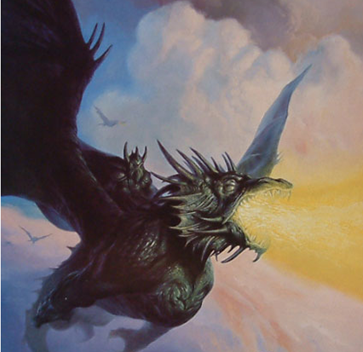
“The Peculiar Olympians” is a series of blog posts about my most favourite fictional characters. They are each here for some combination of sympathy, empathy, inspiration, humour, quality, staying power, and/or significance to my relationship with fandom. These are not all the characters that I like, but they are the ones that have stood out to me the most. The list is also alphabetical and nothing more.
I’ve loved dragons since before I can remember, but I can also be extremely picky about them. Usually I’m not interested in saintly magical companions or creatures of absolute evil, and keep hunting for something a little bit more interesting.
However, it’s surprisingly easy for me to pick just one dragon character as my favourite: Khisanth, from the novel The Black Wing by Mary Kirchoff. She’s from the Dragonlance series of books, which I know are mostly drivel, but Khisanth’s portrayal is that kind of happy cosmic accident that Peculiar Olympians are sometimes made of.
Khisanth is a black-scaled dragon, which in this setting means she is greedy and impulsive, breathes green acid, and prefers swampy, wet areas. She is the offspring of Takhisis, the Queen of Darkness, along with four other chromatic dragon breeds. Khisanth was at some point ordered to go underground and sleep after her Queen’s defeat in a war, waking up an adult, after which she wandered the world and had several adventures, before being exiled to an underground city to guard a magical artifact.
Khisanth, a.k.a. Onyx, is far better known as the minor antagonist that appeared in the first Dragonlance novel, Dragons of Autumn Twilight. In that book, she is an utterly generic villain, easily dispatched through the touch of a magical staff that turns her to ash, the same one she was to guard. The Black Wing is then a prequel, written by a different author, though it was years before I understood this, having completely avoided the founding Dragonlance books in favour of reading stories about dragons.
Normally these conditions would be several kisses of death to a book’s quality, but what emerges instead is a new take on a generic fantasy world, told through the viewpoint of an evil minion, one who is a tragic but also aggravatingly stupid anti-hero. Khisanth in the book has a personality that’s a combination of a spoiled child and a sadist carnivore, but manages to be sympathetic because she is capable of forming friendships, and does not directly serve evil until the final third of the book. Even then, because it’s from her viewpoint and before the latest war truly begins, it’s harder to see her as a mere villain.
Furthermore, Khisanth’s life is horrible. She regularly makes huge mistakes and never learns from them, and in the end fate throws her together with a human that she despises, one who murdered Khisanth’s friend and comrade because he felt Khisanth was a more worthy dragon. This is an assignment which she eventually breaks in the worst way, killing the man when she is sure that history is about to repeat itself. Yet Khisanth continually believes that she has a great destiny in store for herself. Readers who have read the original novel know exactly what is in store for Khisanth, and that tinges The Black Wing with a sense of clumsy tragedy.
Khisanth is my ideal dragon character because she operates between two extremes. She is like the “monstrous” dragon in terms of power, but instead of being a plot device, something saved for the climax, she is a protagonist. Unlike the saintly companion dragon, she actually has flaws, and in a subversive twist, refuses to have a rider until fate intervenes. Furthermore, with humans to contrast herself against, she retains some dragon grandeur, rather than being a talking animal as in some dragon-viewpoint books. Thus far, none of the professional and original dragon characters that I’ve read have managed to achieve this kind of potent mixture. Part of me does wish something like Khisanth emerged in an original work, but I’m usually content to accept what it is.

No comments:
Post a Comment